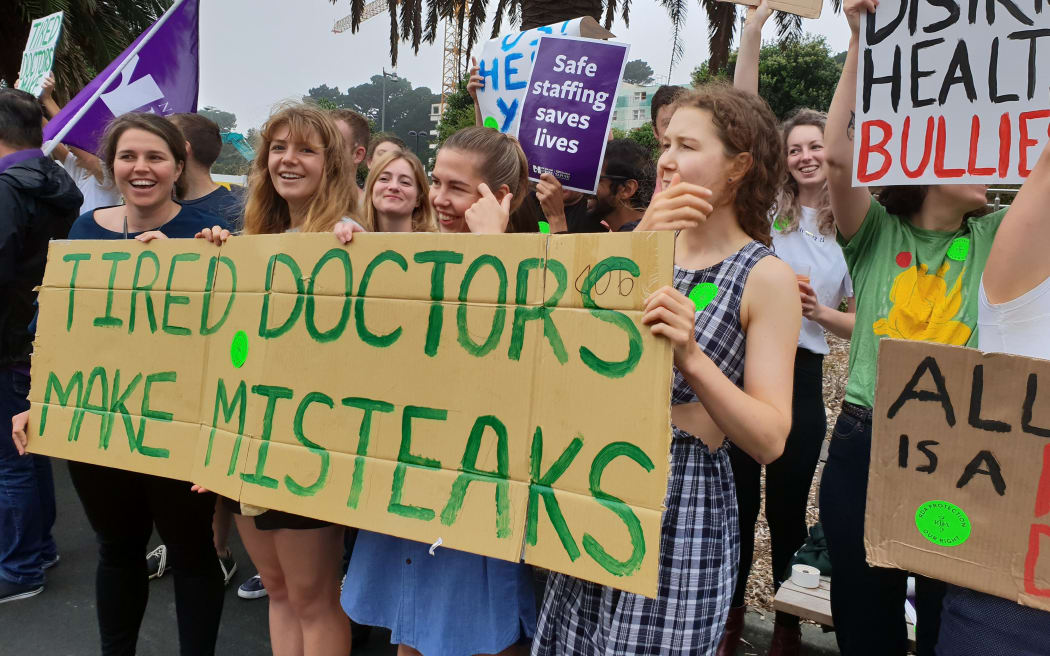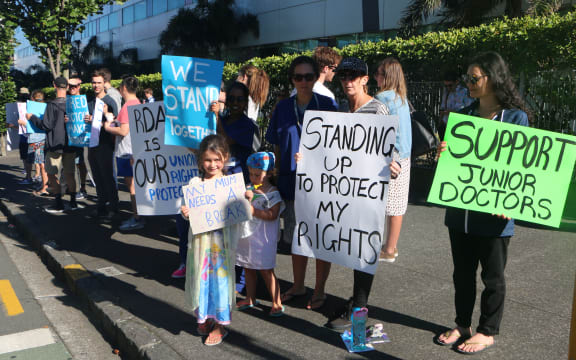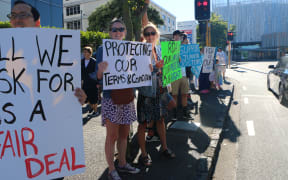Some senior doctors are calling for an end to the row between junior doctors and district health boards, saying each strike is more damaging to patient care and is unacceptable.

As junior doctors walk off the job again from tomorrow, some of their senior colleagues are complaining about their fatigue and the harm being caused to patients. Photo: RNZ / Karen Brown
Junior doctors will strike again tomorrow until early Thursday in their row with their employers over proposed changes to sections of their employment contract dealing with rosters.
Both sides were in mediation twice last week, and more mediation is planned for Friday, but there is no sign of compromise.
In a letter sent last Wednesday, senior doctors at Palmerston North Hospital wrote to their DHB, as part of the collective of all 20 DHBs, saying the protracted nature of the dispute had led them to have serious concerns about fatigue among senior doctors.
They said they were also worried about "the resultant increasing difficulty in covering the acute hospital duties normally performed by RMOs [resident medical officers, or junior doctors]".
They said that during the second strike, at the end of January, they had heard reports of senior doctors working excessive hours. One reported that he or she would have worked nearly 30 plus hours if a colleague had not "kindly offered to be the on-call from midnight until 8.30 am".
The doctors say some non-striking junior doctors are also "working nights, then returning to work the next day and doing two long days in a row".
In their letter, obtained by RNZ, they said: "None of this can be considered 'business as usual', even as some services have tried to maintain elective throughput (exacerbating our concerns and in essence increasing clinical risk to patients and staff). Suggestions in some services that 'catch-up clinics' be undertaken in between strikes are as unwelcome as they are unrealistic for routinely stretched services."

Junior doctors on the picket line at Auckland Hospital last month. Photo: RNZ / Brooke Jenner
The doctors are part of the Combined Medical Staff at the MidCentral DHB. Their chair, renal physician Curtis Walker, added in the letter that as fatigue and frustration worsen, it was leading to difficulty maintaining cover for acute services and staffing acute rosters with cover by senior doctors. "In essence, the acute hospital may not be able to be fully covered during the upcoming 3rd RMO [junior doctor] strike, which is a deeply concerning situation. In medicine for example we now have single SMOs [senior doctors] covering multiple doctors' acute duties, and an acute medical team is not covered at all (at the time of writing)."
The doctors said delays to already stretched waiting lists in both medicine and surgery were worsening, including for time-critical cancer surgery. "Multidisciplinary meetings are being cancelled, compounding the effects on the care of our most complex patients."
The group said each subsequent strike was more damaging to the care of patients and therefore unacceptable.
They urged the DHBs generally and the Resident Doctors' Association to "focus on the common ground of safe staffing and safe patient care in order to settle the dispute as soon as possible, and without any further industrial disruption".
Dr Walker holds the honorary title of life member of the RDA, having been a president for five years. He said he was no longer a financial member or part of its day-to-day activities.






